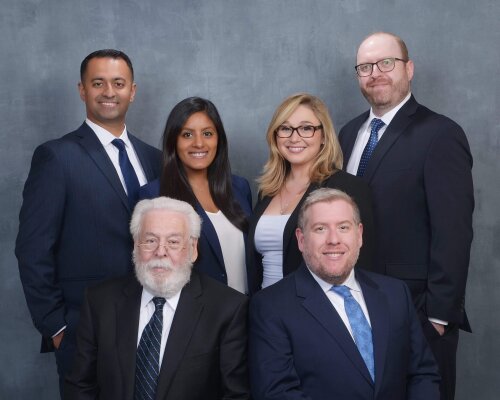Best Appeal Lawyers in Philadelphia
Share your needs with us, get contacted by law firms.
Free. Takes 2 min.
List of the best lawyers in Philadelphia, United States
About Appeal Law in Philadelphia, United States
An appeal is the legal process by which a higher court reviews a decision made by a lower court or tribunal. In Philadelphia, appeals can arise from criminal convictions, civil judgments, family court orders, administrative agency decisions, and other trial-court determinations. The typical path for a state-law appeal from a Philadelphia trial court is from the Philadelphia Court of Common Pleas to an intermediate appellate court - commonly the Pennsylvania Superior Court for many civil and criminal matters or the Commonwealth Court for many administrative and government-related cases - and then, in select matters, to the Supreme Court of Pennsylvania. For federal cases filed in the Eastern District of Pennsylvania, appeals proceed to the United States Court of Appeals for the Third Circuit, which sits in Philadelphia, and then to the U.S. Supreme Court only by discretionary review. Appeals focus on alleged legal errors in the trial record rather than re-trying factual disputes, and they are governed by strict procedural rules and deadlines.
Why You May Need a Lawyer
Appeals are largely written-argument proceedings with strict formal requirements. You may need an appellate lawyer when:
- Your case involves complex legal questions where error by the trial court may lead to reversal or modification.
- Important deadlines apply, such as the requirement to file a notice of appeal, post-trial motions, or petitions for allowance of appeal.
- The record must be compiled, transcripts ordered, and relevant portions designated for the appellate court.
- Briefs must be drafted to explain the legal error and why the appellate court should grant relief - writing persuasive appellate briefs requires specialized skill.
- You need to request an emergency stay or a supersedeas bond to halt enforcement of a judgment pending appeal.
- You seek post-conviction relief following a criminal conviction, which involves distinct remedies and procedural traps.
An experienced appellate lawyer helps preserve issues at trial, prepares the record correctly, crafts legal arguments tailored to likely standards of review, and manages timing and procedural compliance.
Local Laws Overview
Key local and procedural points relevant to appeals in Philadelphia include:
- Court structure - Philadelphia trial-court appeals usually start in the Philadelphia Court of Common Pleas. For state appeals, the Superior Court and Commonwealth Court are the intermediate appellate courts, and the Supreme Court of Pennsylvania is the state court of last resort. For federal matters, appeals go to the U.S. Court of Appeals for the Third Circuit and potentially to the U.S. Supreme Court.
- Procedural rules - Appeals in Pennsylvania are governed by the Pennsylvania Rules of Appellate Procedure. Federal appeals use the Federal Rules of Appellate Procedure and the Third Circuit Local Rules in federal matters. These rules set filing deadlines, formatting, briefing schedules, page limits, and procedural requirements for the record.
- Deadlines - Appellate deadlines are strict. In many Pennsylvania civil and criminal cases, a notice of appeal must be filed within 30 days of the entry of the order or judgment. Some interlocutory appeals and special procedures can have different deadlines. Post-conviction petitions often have separate limitation periods, such as the Pennsylvania Post Conviction Relief Act time limits.
- Standards of review - Appellate courts defer to trial courts on factual findings but review legal questions de novo. Common standards include de novo review for pure questions of law, abuse of discretion for discretionary rulings, and clearly erroneous for some factual determinations.
- Record and transcript requirements - Appellate courts generally act on the record created in the trial court. Transcripts, exhibits, and a certified record must be compiled and designated correctly to preserve issues for appeal.
- Stay and bond requirements - To halt enforcement of a civil money judgment during appeal, courts often require a supersedeas bond or other security. Criminal appeals do not automatically stay sentences in all cases.
Frequently Asked Questions
What is the first step to start an appeal in Philadelphia?
The first step is usually filing a notice of appeal with the trial court clerk within the time limit specified by the applicable rules. You should confirm the exact deadline and any required post-trial motions that may affect timing. After filing the notice, you must ensure the record and transcripts are ordered and prepared for the appellate court.
How long do I have to file an appeal?
Deadlines vary by case type and jurisdiction, but many Pennsylvania appeals require a notice of appeal within 30 days of the entry of the final order or judgment. Federal appeals commonly require a notice of appeal within 30 days in civil cases, and shorter deadlines can apply in some circumstances. Because missed deadlines can forfeit your right to appeal, consult an attorney immediately.
Can I represent myself on appeal?
Yes, a party can proceed pro se on appeal, but appellate practice has specialized rules and technical requirements. Self-represented appellants must prepare the record, comply with formatting and briefing rules, and meet strict deadlines. Many pro se litigants find it advisable to at least consult an appellate lawyer or use legal clinics for guidance.
Will the appellate court hear new evidence?
No. Appellate courts review the trial record and do not receive new evidence or witness testimony. If important evidence was not presented at trial, appeals are generally not the appropriate vehicle to introduce it. Some extraordinary post-conviction or collateral review processes may allow consideration of newly discovered evidence under specific conditions.
How long does an appeal take?
Appeal timelines vary widely. Simple appeals can take several months, while complex appeals or those that go to the state supreme court can take a year or more. Additional delays come from ordering transcripts, briefing schedules, and the court s calendar. Expect a multi-month process and plan accordingly.
What is the standard of review and why does it matter?
The standard of review is how an appellate court evaluates the trial court s decision. It matters because it affects the likelihood of reversal. Legal questions reviewed de novo give the appellant a stronger chance, while abuse of discretion or clearly erroneous standards are more deferential to the trial court. Appellate briefs must identify the correct standard for each issue.
Can I get a stay of the judgment while the appeal is pending?
Possibly. For civil money judgments, a court may require a supersedeas bond or other security to stay enforcement of the judgment during appeal. In criminal cases, a stay of sentence or release pending appeal is less common and depends on statutory criteria, bail conditions, and the court s discretion. Emergency relief can sometimes be sought from the appellate court.
What happens if I lose an appeal?
If you lose, options may include requesting reargument in the same appellate court, filing a petition for allowance of appeal to a higher court if available, or pursuing collateral remedies such as post-conviction relief in criminal cases. Each option has its own deadlines and standards, so prompt legal advice is important.
Do appeals cost a lot of money?
Appeals can be costly because of attorney fees, transcript costs, record preparation, and filing fees. Appellate lawyers may charge by the hour or offer flat fees for certain tasks. In civil cases, contingency fees for appeals are less common than in trial practice. Fee waivers or indigent-applicant procedures may be available for those who qualify.
What is post-conviction relief and how does it differ from a direct appeal?
Post-conviction relief is collateral review that challenges the legality of a conviction or sentence outside the direct appeal process. In Pennsylvania, a common route is filing a petition under the Post Conviction Relief Act. Post-conviction claims often raise issues like ineffective assistance of counsel or newly discovered evidence and are subject to separate procedural rules and time limits. They do not replace a direct appeal and are generally filed after direct appeals are exhausted.
Additional Resources
For procedural guidance and support you can consult or contact local organizations and court offices in Philadelphia, including the Philadelphia Court of Common Pleas clerk s office and the clerk s offices of the Pennsylvania Superior Court and Commonwealth Court for state appeals. For federal matters, the clerk of the U.S. Court of Appeals for the Third Circuit and the clerk of the Eastern District of Pennsylvania can provide procedural information.
Legal help and referrals can be sought from the Philadelphia Bar Association and the Pennsylvania Bar Association. For those who cannot afford private counsel, community organizations and legal aid providers in Philadelphia can assist, such as public defender offices for criminal matters, legal aid societies for civil needs, and law-school clinics that sometimes handle appeals or provide appellate guidance.
Self-help materials are available through courthouse self-help centers and court-published rules, including the Pennsylvania Rules of Appellate Procedure and the Federal Rules of Appellate Procedure. Local law libraries and courthouse libraries also offer research assistance and form materials.
Next Steps
If you believe you have grounds for an appeal, take these steps right away:
- Act fast - identify and comply with the applicable filing deadline for a notice of appeal or any required post-trial motion. Missing a deadline commonly results in loss of appellate rights.
- Preserve the record - ensure the trial record, transcripts, and exhibits are preserved, certified, and made available for the appellate court. Order transcripts promptly because preparation can take time.
- Consult an appellate attorney - get an initial consultation with a lawyer experienced in appeals to evaluate your issues, identify likely standards of review, estimate time and cost, and determine the best strategy.
- Consider indigent-assistance options - if you cannot afford counsel, contact public defender or legal aid organizations to learn about eligibility for appointed counsel or fee waivers.
- Prepare for the process - appellate practice emphasizes written briefs and legal research. Expect a multi-step process that may include briefing schedules, possible oral argument, and time for decision.
Appeals are technical and time-sensitive. Early consultation with counsel and prompt action to preserve rights give you the best chance of meaningful review of your case.
Lawzana helps you find the best lawyers and law firms in Philadelphia through a curated and pre-screened list of qualified legal professionals. Our platform offers rankings and detailed profiles of attorneys and law firms, allowing you to compare based on practice areas, including Appeal, experience, and client feedback.
Each profile includes a description of the firm's areas of practice, client reviews, team members and partners, year of establishment, spoken languages, office locations, contact information, social media presence, and any published articles or resources. Most firms on our platform speak English and are experienced in both local and international legal matters.
Get a quote from top-rated law firms in Philadelphia, United States — quickly, securely, and without unnecessary hassle.
Disclaimer:
The information provided on this page is for general informational purposes only and does not constitute legal advice. While we strive to ensure the accuracy and relevance of the content, legal information may change over time, and interpretations of the law can vary. You should always consult with a qualified legal professional for advice specific to your situation.
We disclaim all liability for actions taken or not taken based on the content of this page. If you believe any information is incorrect or outdated, please contact us, and we will review and update it where appropriate.










